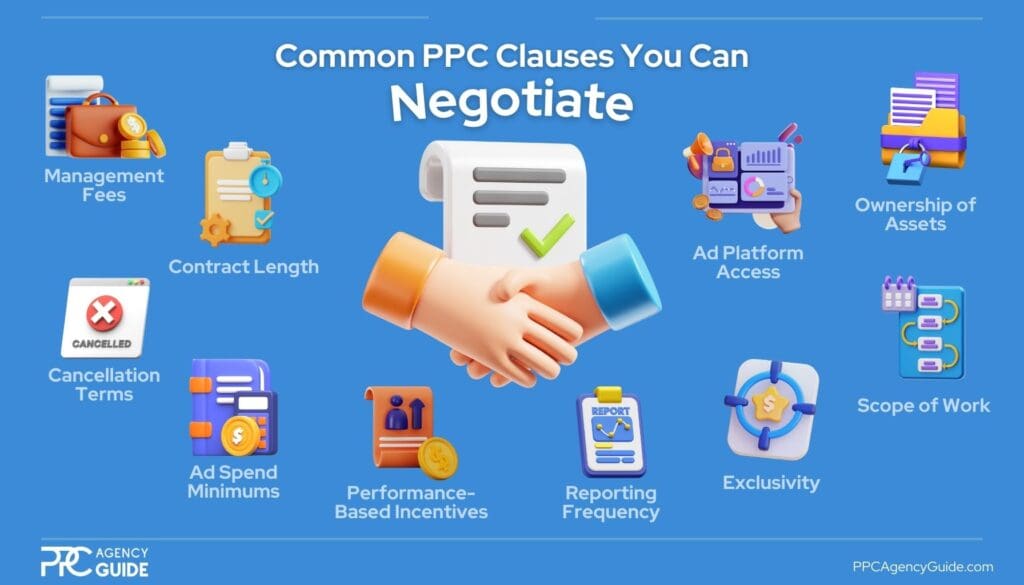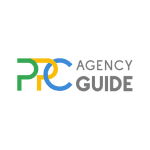
Let’s be real. Contracts of any type almost always favor the entity writing them. It’s no different when your business signs up with a new vendor, such as a pay-per-click (PPC) agency. Odds are that your agency has a boilerplate contract that gets used with every client. It’s not designed specifically for you, nor is it designed to protect your business. That doesn’t mean the agency is up to no good. It’s just the nature of business contracts. But, you can negotiate terms and ensure your contract has a little more balance. In this guide, we’ll walk you through the basics of PPC contract negotiation, including what to look for and tips to help ensure your negotiations go smoothly.
The Anatomy of a Typical PPC Contract
A strong PPC contract is the foundation of your partnership with the agency. It sets clear expectations, protects both parties, and ensures accountability by defining roles, responsibilities, and deliverables. Without it, misunderstandings can lead to wasted time, money, and effort.
Things PPC Agency Contracts Usually Cover
A typical PPC contract outlines critical details such as:
- Scope of Work: The specific services the agency will provide, like keyword research, ad copywriting, or campaign management.
- Goals: What you want to achieve. For instance, 72 percent of digital advertisers worldwide identified efficient growth as their primary PPC objective, while improving efficiency ranked second at 19 percent, per Statista.
- Pricing: The cost structure, including management fees, ad spend, and any potential bonuses or penalties.
- Timelines: The length of the contract and key project deadlines.
- Reporting: Frequency and format of performance updates.
- Ownership: Who controls the ad accounts, campaign data, and creative assets.
- Termination: Cancellation terms, including notice periods and penalties.
Common PPC Clauses You Can Negotiate
Next, let’s take a look at some of the areas your contract is likely to cover and how to determine if a clause will suit your business. If a clause in your contract seems outside the norm or unfair based on the details below, it’s worth discussing with your PPC agency.

Management Fees
Costs to run PPC ads are divided into ad spend and management fees, which pay your agency for managing campaigns. These fees can vary widely depending on the agency’s expertise, workload, and pricing model.
Why Management Fees Matter
Management fees are a significant part of your PPC costs and directly impact your ROI. If fees are disproportionate to the value the agency provides, it can hurt your bottom line.
What’s Normal in the Industry
Most agencies charge 15 to 20 percent of ad spend, with flat fees typically ranging from $1,500 to $5,000 per month, depending on campaign complexity and the scope of services. Highly specialized agencies or those operating on performance-based models may charge more, but they should justify the premium with better results.
How to Tell if Your PPC Management Fees Are Fair
To assess fairness, consider these practical benchmarks:
- For Smaller Budgets (Under $5,000 in Ad Spend): A flat fee of $1,500–$2,000 is reasonable, as percentage-based fees may be too high for lower budgets.
- For Larger Budgets ($10,000+ in Ad Spend): A percentage model of 15 to 20 percent of ad spend is typical. For example, with a $15,000 budget, a 15 percent fee would be $2,250.
- Value Beyond Campaign Basics: If the agency includes services like landing page optimization, advanced reporting, or strategic consulting, higher fees can be justified.
- Transparency: Fair contracts clearly outline what’s included in the fee, such as campaign setup, optimization, or analytics, and there should be no hidden charges.
Contract Length
Contracts define the length of your agreement with the agency, which can range from short-term trials to year-long commitments.
Why Contract Length Matters
The length of your contract impacts your flexibility. Shorter PPC agency terms let you reassess performance frequently, while longer terms may offer cost savings or stability.
What’s Normal in the Industry
Most contracts are 6 to 12 months, often with automatic PPC contract renewal clauses. Month-to-month agreements are available but may come with higher fees.
How to Tell if Your Contract Length is Fair
To decide if your contract term makes sense, consider these factors:
- If You’re New to the Agency: A three-to-six-month trial can help you gauge performance before committing to a long-term deal. Note that many agencies require a minimum of three months because it takes time to optimize campaigns and start seeing results. Ending a contract during this startup and optimization phase is usually not in your best interest unless you have evidence of serious wrongdoing.
- For Proven Partnerships: Longer terms, such as 12 months, can allow you to secure consistent pricing and streamline renewals.
Cancellation Terms
Cancellation clauses determine how and when you can end your agreement with the agency.
Why Cancellation Terms Matter
Fair cancellation terms ensure you’re not stuck paying for a service that isn’t delivering results, allowing you to pivot quickly when needed.
What’s Normal in the Industry
A standard cancellation clause requires 30 to 90 days’ notice, with some contracts including penalties for early termination, such as paying out the remaining months.
How to Tell if Your Cancellation Terms Are Fair
Evaluate your cancellation terms using these benchmarks:
- Notice Period: A 30-day notice period is reasonable for most businesses. Anything longer could unnecessarily restrict you.
- Termination Penalties: If the contract requires payment for unused months, ask for those penalties to be reduced or eliminated.
- Flexibility for Poor Performance: Contracts should allow cancellation without penalties if the agency doesn’t meet agreed-upon performance benchmarks.
Ad Spend Minimums
Ad spend minimums dictate the lowest amount your business must allocate to campaigns each month.
Why Ad Spend Minimums Matter
The right minimum ensures your campaigns are large enough to deliver results but doesn’t force you to overspend on unnecessary ad volume.
What’s Normal in the Industry
Typical ad spend minimums range from $2,000 to $5,000 per month, depending on the platform and the agency’s size and expertise.
How to Tell if Your Ad Spend Minimums Are Fair
Here’s how to evaluate if your minimums align with your goals:
- For Small Businesses: If your marketing budget is limited, a $2,000 minimum is reasonable. Forcing higher spends may waste resources.
- Expected ROI: The agency should explain how your ad spend translates to results. For example, are you likely to see enough leads to justify the cost?
- Platform Differences: Minimums may vary by platform. For instance, Google Ads campaigns often require more budget than social media ads to perform well.
Performance-Based Incentives
This clause ties agency compensation to meeting specific goals, such as increasing conversions or reducing costs.
Why Performance-Based Incentives Matter
Tying fees to results ensures your agency is invested in your success, creating a win-win relationship where both parties benefit from strong performance.
What’s Normal in the Industry
Performance-based incentives are less common but negotiable. A typical structure might include a base fee with a bonus for hitting metrics like a 15 percent increase in ROAS or reaching a target CPA.
How to Tell if Incentives Are Fair
To determine if a performance-based structure works for you:
- Clear Metrics: Agree on measurable KPIs, like ROAS, lead volume, or conversion rates, to avoid ambiguity.
- Balanced Risk: Ensure the agency has a reasonable baseline fee, so they remain motivated without taking excessive risks.
- Past Success: Ask if the agency has implemented similar models before and what results they’ve achieved for other clients.
Reporting Frequency
This clause outlines how often you’ll receive updates on campaign performance and what information the reports will include.
Why Reporting Frequency Matters
Frequent, detailed reports help you monitor progress, identify potential issues early, and hold your agency accountable.
What’s Normal in the Industry
Most agencies provide monthly reports, though larger accounts may receive weekly or biweekly updates. Reports should include metrics like impressions, clicks, conversions, and ROI.
How to Tell if Your Reporting Terms Are Fair
Ensure your reporting terms meet these criteria:
- Depth of Insights: Reports should go beyond surface metrics to include analysis and recommendations. For example, they might highlight which keywords are driving the best conversions.
- Frequency: Small businesses may find monthly reports sufficient, while larger campaigns benefit from weekly updates.
- Accessibility: Reports should be easy to understand, with explanations of metrics and trends for non-experts.
Ownership of Assets
Ownership clauses determine who controls your PPC accounts, campaign data, and creative assets.
Why Ownership Matters
If your agency retains ownership, switching providers can disrupt your campaigns and cause you to lose access to valuable data you’ve paid for.
What’s Normal in the Industry
Many agencies create ad accounts under their own name unless you explicitly request otherwise. Some may charge a fee for transferring ownership upon termination.
How to Tell if Your Ownership Terms Are Fair
Evaluate ownership terms with these points in mind:
- Account Control: The contract should clearly state that you retain ownership of ad accounts, creatives, and data. Without this, you risk losing access if you part ways.
- Transfer Fees: If there are fees for transferring assets, ensure they’re reasonable and clearly explained upfront.
- Access During the Partnership: Even if the agency retains some ownership, you should have full access to your account data while the contract is active.
Ad Platform Access
This clause specifies whether you can view or manage your campaigns directly in advertising platforms like Google Ads or Facebook Ads.
Why Ad Platform Access Matters
Without access, you’re entirely reliant on your agency for updates, which can limit your ability to monitor performance and ensure transparency.
What’s Normal in the Industry
Agencies typically provide read-only access to ad platforms, allowing you to view performance without making changes. Full admin access is less common but can be negotiated.
How to Tell if Your Access Terms Are Fair
Here’s how to determine if your level of access is appropriate:
- Read-Only Access: At a minimum, you should be able to log in and view your campaigns, budgets, and performance metrics.
- Admin Access: For businesses that want greater control, admin access allows you to make changes. However, this isn’t always necessary unless you’re co-managing the account and have a PPC specialist on staff that can make informed changes while communicating with your PPC agency.
- Transparency: If access is denied, ask for detailed reports and regular walkthroughs to stay informed about your campaigns.
Scope of Work
The scope of work outlines the specific services your agency will provide, such as keyword research, ad copywriting, and campaign management.
Why Scope of Work Matters
A clearly defined scope prevents misunderstandings about what’s included, helping you avoid unexpected charges for services you assumed were covered.
What’s Normal in the Industry
Most contracts include basic PPC services like campaign setup, keyword research, and ongoing optimization. Additional services, like landing page design or advanced analytics, may incur extra costs.
How to Tell if Your Scope of Work is Fair
Evaluate the scope of work using these guidelines:
- Deliverables: Ensure the contract specifies exactly what the agency will do, such as A/B testing, bid adjustments, or ad creative development.
- Extras: Confirm whether services like landing page creation or custom analytics dashboards are included or available for an additional fee.
- Clarity: Avoid vague language like “campaign management,” which can lead to differing expectations about what’s covered.
Exclusivity Clauses
Exclusivity clauses dictate whether the agency can work with your competitors during or after your partnership.
Why Exclusivity Clauses Matter
Without exclusivity, your agency could apply strategies they’ve developed for you to help your competitors, putting your business at a disadvantage.
What’s Normal in the Industry
Exclusivity is more common in competitive industries or smaller geographic markets. Agencies may offer regional or industry-specific exclusivity but often charge a premium for it.
How to Tell if Your Exclusivity Terms Are Fair
Here’s how to assess whether exclusivity clauses are reasonable:
- Industry Competitors: If you’re in a niche or highly competitive market, insist on exclusivity for direct competitors to protect your strategy and data, but be prepared to pay extra for this.
- Regional Considerations: For businesses with a local focus, exclusivity should cover your geographic market but may not need to extend nationally.
- Duration: Ensure exclusivity doesn’t extend too far beyond the contract period unless you’re receiving significant benefits in return.
Clauses You Should Ask to Be Amended or Removed
Sometimes, PPC agencies will slide in terms that protect them while putting you at a disadvantage or that streamline the process but limit your flexibility. If you catch any of these in your contract, it’s essential to address them before signing.

Vague “Best Effort” Language
Some contracts include vague terms like “the agency will use best efforts” without defining what this means in practice.
Why “Best Effort” Language is a Problem
This language provides no clear accountability and allows the agency to avoid delivering measurable results. For example, if the agency promises to “improve campaign performance,” it can claim success without showing meaningful metrics, such as better ROAS or reduced CPA.
How to Address “Best Effort” Language
Ask for vague terms to be replaced with specific deliverables and timelines. For example, instead of “improve performance,” the contract should state, “increase conversions by 20 percent within three months” or “reduce CPA to $50.”
Unrestricted Subcontracting
Some contracts allow the agency to outsource your account work to third parties without your approval or knowledge.
Why Unrestricted Subcontracting is a Problem
Outsourcing can lead to lower-quality work, off-brand advertising, slower response times, and reduced accountability. For instance, if your campaigns are handed off to freelancers or junior subcontractors, they may not receive the same level of expertise you were promised.
How to Address Unrestricted Subcontracting
Revise the clause to require written approval before any subcontracting occurs. This ensures you retain control over who works on your campaigns and protects the quality of service.
Non-Disclosure Agreements Favoring the Agency
Some contracts include NDAs that prevent you from publicly discussing your experience with the agency, even in honest reviews or feedback.
Why Non-Disclosure Agreements Favoring the Agency Are a Problem
These one-sided NDAs silence your ability to warn others about poor performance or unethical practices. They also make it harder to share lessons learned with your internal team or other vendors.
How to Address Non-Disclosure Agreements
Request a balanced NDA that protects both parties without unfairly silencing you. For example, limit the NDA to sensitive campaign data, not your overall experience with the agency.
Agency Control Over Ad Strategy Without Oversight
Some contracts grant the agency full control over your campaigns, including creative direction, messaging, and targeting, with no client input.
Why Agency Control Over Ad Strategy is a Problem
This setup risks misaligned messaging that doesn’t reflect your brand or business goals. For example, an agency could run ads with aggressive sales language that alienates your audience, damaging your reputation.
How to Address Agency Control Over Ad Strategy
Revise the clause to include mandatory client approvals for major strategy decisions, creative materials, and targeting criteria. This ensures your campaigns stay aligned with your brand and goals.
Broad Liability Waivers for the Agency
Some contracts include clauses that absolve the agency of all liability for errors, poor performance, or platform violations.
Why Broad Liability Waivers Are a Problem
These waivers leave your business vulnerable if the agency’s mistakes harm your campaigns. For example, if the agency violates Google Ads policies and your account is suspended, you could bear the financial loss without recourse.
How to Address Broad Liability Waivers
Replace broad waivers with balanced terms that hold the agency accountable for negligence, policy violations, or major errors. For example, the contract could specify that the agency must resolve any issues caused by their actions at their expense.
Hefty Down Payments
Some contracts require a large upfront payment before any work begins. This makes sense on the surface. A lot of work occurs before your campaigns launch, and the agency deserves to be compensated for that. However, this does create some risks for the business.
Why Hefty Down Payments Are a Problem
Paying a significant amount upfront without clear deliverables leaves you vulnerable. In the worst cases, unscrupulous agencies may take the payment and delay, or never launch, your campaigns. Even with reputable agencies, large down payments can put unnecessary strain on your cash flow, especially if campaign performance takes time to ramp up.
How to Address Hefty Down Payments
To mitigate this risk, request a smaller upfront payment tied to specific initial deliverables. For example, instead of paying 50 percent of the contract upfront, propose a smaller initial fee, such as 10 to 20 percent, to cover the onboarding process, account setup, and initial campaign creation. Ensure the contract specifies these deliverables with deadlines, such as “Campaigns will be live within 14 days of payment”. Additionally, structure the remainder of payments as monthly or milestone-based installments, which ensures the agency continues delivering value over time.
Clauses You Should Ask For
Ensuring all the areas covered so far are addressed in your PPC contract is a great start. However, there are some clauses that don’t always appear in PPC contracts that you may want to ask for. We’ll cover these below.
Performance Benchmarks
Benchmarks set clear expectations for results, ensuring accountability and transparency. For instance, if your goal is to maintain a ROAS of 4:1 or lower your CPA to $50, having these targets in writing ensures everyone is aligned on priorities.
Collaborate with your agency to identify realistic KPIs that reflect your goals. Include metrics such as conversion rates, lead volume, or return on ad spend (ROAS) and agree on timelines for review and adjustments if benchmarks aren’t met.
Account Handover Plan
Without a handover plan, switching agencies can lead to lost data, disrupted campaigns, and unnecessary downtime. For example, if you lose access to historical data from Google Ads, it can take months to rebuild the insights that drive performance.
Request a clause outlining the agency’s responsibility to transfer all accounts, campaign data, and creative assets. Include a timeline for the transfer, such as within 14 days of termination and short-term support during the transition.
Strategic Planning Collaboration Clause
A collaboration clause ensures the agency works closely with you to align campaigns with your broader business goals. For example, if your company launches a new product, this clause ensures the agency consults with you on how to adjust your campaigns to maximize impact.
Include provisions for regular strategy meetings, such as monthly or quarterly, to review performance and discuss new ideas. This guarantees the agency involves you in key decisions and keeps your brand’s needs at the forefront of campaign planning.
Budget Adjustment Flexibility
Ad spend isn’t static. Your budget might need to grow or shrink depending on campaign performance, seasonal trends, or cash flow. This clause ensures you can make adjustments without penalties or delays.
Ask for flexibility to adjust your monthly ad budget within a defined range, such as plus or minus 20 percent, and include a provision that adjustments are reviewed collaboratively with the agency.
Campaign Testing and Innovation Clause
Regular testing is critical for optimizing campaigns and staying ahead of competitors. This clause ensures your agency is proactively testing new strategies, creatives, or targeting options.
Request a commitment to periodic testing, such as one new test per quarter, and require a detailed report summarizing results and recommendations for scaling successful experiments. This keeps your campaigns fresh and innovative without relying on stagnant strategies. You may also want to ask for ad refreshes at specific intervals or based on metrics to ensure ad fatigue doesn’t diminish your results.
Tips for PPC Contract Negotiation
Negotiating a PPC contract doesn’t have to be adversarial. With the right approach, you can ensure the agreement works for both you and the agency, setting the stage for a successful partnership. Here are some practical tips to help you navigate the process.
Start with Clear Expectations
Share your business goals upfront to ensure the agency understands what you’re trying to achieve. For example, “I want to increase leads while keeping my CPA under $50” gives them a clear target to work toward and helps guide the discussion.
Ask Questions Instead of Demanding Changes
Approach negotiation with curiosity rather than confrontation. Use questions like, “Can you explain why this clause is important?” or “How does this fee structure compare to what other clients typically pay?” This encourages collaboration and helps uncover the agency’s perspective.
Frame PPC Negotiation as a Partnership
Position the conversation as a mutual effort to ensure success. Say something like, “I want this contract to work for both of us and set the foundation for a strong, long-term relationship.”
Use Industry Standards as Leverage
If you’re uncomfortable with a clause, reference what you know about typical practices. For instance, “I’ve seen other contracts with a 30-day cancellation notice instead of 90 days. Would that be possible here?” shows you’ve done your research and opens the door for revisions.
Be Transparent About Budget Constraints
If cost is a concern, let the agency know early. A statement like, “Our marketing budget is tight this quarter. How can we structure this to make it work for both of us?” shows honesty and invites collaboration without being demanding.
Propose Alternatives Instead of Just Rejecting Terms
When you encounter a problematic clause, suggest a revision rather than rejecting it outright. For example, “Instead of a 50 percent upfront payment, could we break it into milestones tied to specific deliverables?” keeps the discussion constructive and solution-focused.
Ask for Examples of Flexibility
If the agency seems unwilling to budge on a term, encourage them to share ideas: “Have you worked with other clients on alternative fee structures or timelines? I’d love to hear what’s worked in the past.” This shows you’re open to creative solutions.
Focus on Value, Not Just Cost
Emphasize what you’re willing to pay for rather than just trying to cut costs. Say, “I’m happy to pay a fair fee as long as we’re clear on the deliverables that justify the cost,” to keep the focus on results rather than the dollar amount.
End on a Positive Note
Keep the tone collaborative and optimistic: “I’m confident we can finalize something that works for both of us—I appreciate your flexibility in these discussions.” Ending on a positive note reinforces goodwill and sets the tone for a productive relationship.
Minimize the Need for PPC Contract Negotiation with a Top-Notch Agency
A top-notch PPC agency will develop a contract that works for both of you based on their years of experience. They’ll also proactively walk you through key areas of your contract to ensure you understand the value they’re bringing to your organization. To be matched with an agency that has a strong track record for success and rapport with previous clients, request a complimentary consultation.
FAQs on PPC Contract Negotiation
Can I negotiate terms in a PPC agency contract?
Absolutely! Many agencies are open to adjusting terms, especially if you’re a significant client. Whether you’re focused on reducing fees, extending flexibility, or renegotiating PPC contracts entirely, a collaborative approach is key to reaching a fair agreement.
What are the most important clauses in a PPC contract?
Some of the most critical clauses cover ownership of ad accounts, payment terms, and performance benchmarks. Effective negotiating PPC fees ensures you’re paying a fair amount relative to the results the agency delivers.
How can I ensure my PPC agency is accountable?
Include clear PPC deliverables negotiation in your contract. Define specific goals like conversion rate targets or ROAS, and require regular performance updates to track progress.
What happens if I want to cancel a PPC agency contract?
Check the cancellation terms for notice periods or penalties. If the contract is too rigid, consider asking for adjustments before signing to allow more flexibility in case the agency doesn’t meet expectations.
How much should a PPC agency charge for management fees?
Management fees typically range from 15 to 20 percent of ad spend or a flat monthly rate of $1,500 to $5,000, depending on campaign complexity and size.
What clauses should I avoid in a PPC agency contract?
Watch out for ambiguous terms like “best effort” language, hefty upfront payments, or hidden fees. These can leave you exposed to risks if the agency doesn’t deliver results.
What should I include in a PPC agency contract to protect my interests?
Include clauses for performance benchmarks, flexible payment terms, and ownership of ad accounts. These additions can help you ensure transparency and accountability throughout your partnership.
How can I protect my business when working with a PPC agency?
Focus on transparency. Ensure the contract outlines clear deliverables, ownership rights, and a plan for transitioning accounts if needed.
What are typical payment terms in a PPC contract?
Contracts often require an upfront payment followed by monthly fees. Ensure payment schedules align with deliverables to avoid paying for work that hasn’t been completed.


















